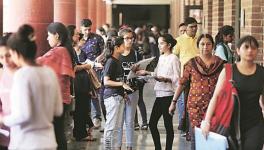Online Open Book Exams During Pandemic -- A Revenge on Students?

Image Used for Representational Purpose Only
Ever since the University of Delhi announced that it was going to conduct online open book examinations for final year students, students and teachers have opposed the move vehemently, pointing out to the obstacles that lie at so many levels regarding the feasibility and sanctity of the process and the serious equity concerns that this process entails.
To make matters worse, the students have gone through a terrible ordeal in the past few weeks because of the volatile swings, uncertainty and speculation that took place over the open book examinations.
Let us review the objections to the online open book exams. There are obvious issues of internet access and speed, particularly because Delhi University students come from far corners of the country and in many places even stable electricity, let alone stable internet, is not regularly available.
More pertinently, most of the outstation students (about half of the university’s student profile) had gone home during the mid-term break when the sudden closure of the university was announced, which was followed by the lockdown. So, the students were caught unawares and hardly had any study material with them. Even if some material has been put up by teachers online, these are hardly sufficient. A bulk of this material cannot even be openly circulated due to copyright restrictions.
Many students do not have laptops at home and, even if for argument’s sake it is accepted that the study materials are all uploaded, do the authorities, in their sanity, expect these students to prepare for their exams using their mobile phone screens? Their predicament is also more intense in a situation where substantial parts of the courses were not completed and the online classes, if held, were hardly any substitute, particularly given accessibility issues.
Also Watch: Open Book Exam: ‘Based on Injustice and Discrimination’
Moreover, exam preparation needs reasonable privacy and a quiet space. The domestic situation of many students may not at all be conducive for that, particularly, when family members are all at home all the time due to the pandemic. Many students who use libraries for regular study and exam preparation have no such access now.
Such a situation may not only be harrowing for a student but also for family members who have to adjust their routines and spaces in a student’s interest. Needless to say that the economically, socially and physically disadvantaged students will face all these problems disproportionately and, within that, given the grossly unequal burden of domestic work that women share at home, they are often likely to end up facing the brunt of the situation.
There are also serious issues about the sanctity of the exams, which remains unanswered. A usual open book exam is open about source material but these strictly bar communication with anybody else, which can be easily violated in this case. How will the university ensure that the answers that students are uploading are not copied from each other (through parallel internet communication) or dictated by someone else? How will the university prevent corruption and the use of money in this situation? Can’t somebody be paid to write the exams on a student’s behalf when all you need is mere access to a password? If just a declaration by the student that he or she is not taking unfair means is enough, then henceforth we should perhaps stop invigilation in regular examinations and make the students just sign an undertaking that they won’t cheat!
Students and teachers, while opposing the examinations on the above grounds, have given concrete alternatives, which have, in fact, been accepted, willy-nilly, for students of non-terminal semesters. The baffling issue thus is why the Ministry of Human Resource Development (MHRD), the University Grants Commission (UGC) or the university authorities think that it is essential to take exams for final semester students when students in other semesters can be promoted without exams by averaging their marks (past semester and current internal assessment).
A sense has been created that students must write the “final exam”. In fact, the HRD minister has been heard stressing the necessity of “antim pariksha” in a television channel interview. It is surprising that the education authorities do not know that universities don’t have final examinations. “Final exams” imply that your entire knowledge of the undergraduate or post-graduate programme is tested in one set of final examinations. That system has not been there in universities for decades, and now with the semester system being implemented across most universities, there is not even a semblance of such “final” exams.
Each semester is independent and often the most foundational courses are taught in the beginning or intermediate semesters. The final semester often carries less weight than some intermediate semesters. If such intermediate semester students can be promoted without examinations in fundamental courses, what is the issue of passing the final semester students, exactly using the same formula used for the others?
The UGC’s recent statement that “the performance in examinations gives confidence and satisfaction to the students and is a reflection of competence, performance and credibility that is necessary for global acceptability” might be debated, but the issue is hardly that. The key question here is the differential treatment of the final semester students compared with the others.
Why are other students being deprived of such “satisfaction” and “credibility”; conversely, haven’t the final semester students written examinations in all the other semesters to be judged on their “competence, performance and credibility”? In fact, ironically, they have written more examinations than the others for statistically forming a more coherent basis for judging their performance.
Quite apart from these serious unresolved and unanswered issues, what happened in the course of the past few weeks is bewildering to say the least. First, there was the buzz everywhere (including all major news sources) that UGC has decided to cancel final year exams and is going to notify that to the universities soon. Students kept waiting for the notification, which ultimately never arrived.
Soon, however, Delhi University postponed the online exams, completely breaking the momentum of examination preparation by students. This also increased speculation that the exams will be postponed.
The bizarre reason given by DU to the Hon’ble Delhi High Court for exam postponement is that the mother of one of its Deputy Registrar tested COVID positive. If one official’s family member being tested positive for coronavirus can be a big enough reason for postponing the entire schedule of examinations, then what about the thousands of students, who themselves or their family members would have been affected by the pandemic? Doesn’t the university see the obvious fallacy in the contrary way it is treating its officials and students? Or, are we to assume that the university is a mighty juggernaut, operating at the whims of its masters and completely out of touch with reality, steamrolling its decisions on the students, without any concern for their lives and wellbeing?
The university has treated students as undeserving of empathy and merely as subjects who need to perform at its mercy and beck and call. The subsequent mess-up in the so-called mock tests was, true to its name, a mockery indeed. The layers of problems which the students faced and its straight-faced denial by the university authorities tell a sorry tale of utter dishonesty and inefficiency.
The final nail in the coffin was the about-turn by UGC on Monday in recommending that examinations for final year students are “to be completed by the end of September 2020” in either offline or online mode. This has been backed up by a MHRD notification, which has mandated that “Final Term Examinations should be compulsorily conducted as per UGC Guidelines”.
This move has created destabilisation across the country wherein so many states, universities and institutions that had cancelled examinations for all students, are being forced to reverse their sensible decision. Quite apart from the stress this is putting on millions of students, this also raises serious questions about the jurisdiction of UGC and MHRD to mandate such practices in the matter of education, a concurrent list subject, when the states in their own judgement of the situation of the pandemic have decided to the contrary.
The Ministry of Home Affair’s unusual letter to the Higher Education Secretary, permitting the conduct of such examinations, further shows how the Centre is intervening in the matter at various levels and attempting to ride roughshod over the states and institutions.
What is heartening and sad at the same time is to see how intensely and rationally the students (and teachers) have protested and appealed to the university authorities and the Central government using all forms of democratic expression and the ultimate futility of that tremendous effort.
The blunt denial of the students’ plea and the huge insensitivity shown to them in the time of a catastrophic pandemic, show that the Central government possibly treats the students as subjects to be disciplined and punished. Whether this is a revenge for the intense student protests that rocked the country months before the pandemic will remain a speculation.
The writer is Associate Professor, Department of Economics, Kirori Mal College, University of Delhi. The views are personal.
Get the latest reports & analysis with people's perspective on Protests, movements & deep analytical videos, discussions of the current affairs in your Telegram app. Subscribe to NewsClick's Telegram channel & get Real-Time updates on stories, as they get published on our website.
























